
Fast, affordable Internet access for all.

Loveland’s municipal broadband utility Pulse is a heartbeat away from expanding into a small neighboring Colorado town eager to offer its residents the same attractive, high-quality Internet access that can be found in Larimer County’s biggest cities.
Officials in Loveland and Timnath, Colorado (pop. 7,800) recently announced the ratification of an Inter-Governmental Agreement (IGA) that greenlight’s a plan to bring ubiquitous, affordable high-speed Internet access to yet another community in the Centennial State, as an increasing number of Colorado cities and towns embrace municipal broadband after years of frustration with the inadequate, high-priced service from the region’s monopoly incumbents.
"The selection of Pulse as our broadband service provider reflects a thorough process of assessment and consideration,” Timnath Town Planner Brian Williamson said in a press statement after the agreement was approved. “We are excited to work together, leveraging their expertise to ensure our residents have access to reliable, high-speed Internet that will contribute to the growth and prosperity of Timnath."
Keeping Up With The Loveland’s
This week Williamson spoke to ILSR about the project and why a town-wide fiber network is such valuable and vital infrastructure.
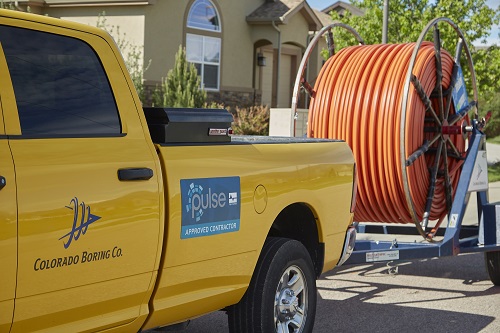
“Timnath is an interesting place. We are predominantly a residential community and we are growing quickly,” he said, adding that in a post-pandemic world of distance learning, remote work, and telehealth, an important part of the mix when people decide where to live and work is whether that community has reliable and affordable high-speed Internet access.
Each year since its creation in 2017, the Indigenous Connectivity Summit (ICS) has convened those working on the frontlines of Tribal connectivity. It brings together decision makers and stakeholders to build support for digital sovereignty and quality, affordable connectivity for Indigenous communities.
With less than 60 percent of those living on Tribal lands in the lower 48 states having access to basic broadband connections – as Native Nations have regularly been excluded from policy conversations around these issues – ICS has become an important voice as the federal government is finally investing billions of dollars to expand high-speed Internet access across Indian Country.
The Summit, held this year in Anchorage, Alaska, was hosted by the Indigenous Connectivity Institute, an affiliate of Connect Humanity, an organization that supports underserved communities’ pursuit of better Internet access and enhancing digital skills. The Summit has become the most prominent event of its type in North America.

Summit participants don’t just convene and talk. They also agree on a series of calls-to-action for governments and other entities with an eye on promoting digital equity in Indigenous communities. Last year’s calls to action, which included messaging around inclusive Tribal consultation, government and industry accountability, Indigenous spectrum rights, and workforce development, served as the foundation for this year’s focus.
Decorah, Iowa is moving forward on a long-percolating plan to expand the city’s core fiber ring to provide affordable broadband access to long-neglected residents and businesses.
While the project has been discussed for years, local officials tell ISLR the project gained renewed momentum during peak COVID, and is creeping closer to launch.
Contracts are still being finalized as the city hopes to spend somewhere around $12 to $15 million to deliver fiber to all 3,000 potential subscriber locations. The full project would take about three years to deliver fiber to all 7,740 city residents, with the first subscribers potentially coming online this fall.
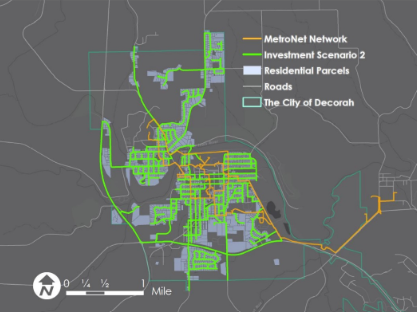
“Decorah has been in pursuit of fiber to the premises for the last 8 to 9 plus years and we finally have broken through some of our challenges on how to get to the finish line,” Chopper Albert, Decorah IT Director told ISLR.
According to Albert, Decorah’s recent progress is thanks in part to new City Manager Travis Goedken, who has long advocated for expanding the city’s existing fiber network to drive affordable fiber access citywide.
New City Management Team Pushes Forward
Since 2013 the city has owned an 11-mile core fiber network, dubbed the Decorah MetroNet. MetroNet was born out of frustration after a major flood in 2008 across much of Iowa resulted in prolonged communications network outages.
MetroNet (not to be confused with the Indiana-based ISP that goes by the same name) currently provides access to Luther College and 18 additional government buildings and anchor institutions.
For over 20 years, the city of Palo Alto, the "Birthplace of Silicon Valley,” has flirted with the idea of building a city-owned municipal fiber network. Now after years of debate, numerous studies, several false starts, and many unfulfilled RFPs, city officials say they’re finally moving forward with a city-owned fiber network they hope will transform affordable broadband connectivity citywide.
Palo Alto officials tell ILSR that the project will be spearheaded by the city-utility, and deployed in coordination with a major upgrade of the city’s electrical systems. Phase One of the city’s planned fiber deployment should begin later this year, delivering fiber access to around 20 percent of the city–or 6,500 homes and businesses.
Phase One will be funded entirely from the utility’s existing cash reserves. Profits from that deployment will then be used to expand affordable, multi-gigabit fiber access to all of the city’s 63,210 residents. Though no shortage of challenges remain.
A Long Time Coming
That Palo Alto residents have been clamoring for better, more affordable alternatives to regional telecom monopolies for 25 straight years speaks for itself. The high costs, slow speeds, and abysmal customer service of regional telecom giants AT&T and Comcast have long driven the public’s unflagging interest in better, cheaper connectivity options.
After years of strategizing, Waterloo, Iowa officials announced in February that they were moving forward with their plan to create a new utility aimed at delivering affordable fiber to every last city resident. While the resulting network is still very much in the planning and construction phase, officials this month released a new website for the project revealing service pricing.
According to the Waterloo telecommunications board, locals will have access to symmetrical 300 megabit per second (Mbps) service, symmetrical 1 gigabit per second (Gbps) service, and symmetrical 10 Gbps service for $50 a month, $70 a month, and $110 a month, respectively. The offerings will see no long-term contracts or usage caps.

Unlike many municipalities, Waterloo is also offering both phone and television bundles. Phone and TV service bundled with 1 Gbps service will cost locals $180 per month, while phone and TV service bundled with 10 Gbps service will be $224 per month.
Andy Van Fleet, chairperson of the board of trustees, tells the Waterloo Cedar Falls Courier that the pricing is notably lower than the prices charged by regional cable monopoly Mediacom. Van Fleet told the paper that Mediacom currently charges him $129 a month for 300 Mbps service, plus the added costs incurred by technically unnecessary usage caps and overage fees.
Edison, New Jersey is proceeding with the construction of an affordable, gigabit-capable fiber network after receiving $2 million cash infusion from state leaders. The resulting network will be built on the back of decades’ worth of local frustration with the high prices, spotty availability, and slow broadband speeds provided by regional monopolies.
The city spent $36,750 on a feasibility study in 2022 to determine the plausibility of building a citywide fiber network. The resulting study by Matrix Design Group found that 87 percent of Edison locals would likely switch to a city-owned and operated fiber network if the option existed.
Edison’s network is in the early stages of planning, and city leaders are only just starting to field competing bids from consulting vendors who’ll then draft a more comprehensive business plan.
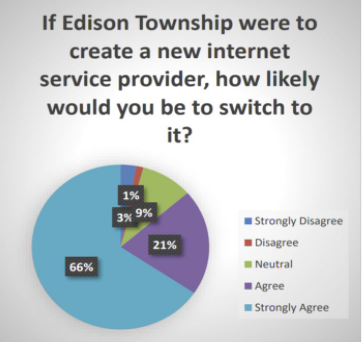
In the interim, the city has received $2 million as part of the New Jersey fiscal year 2024 budget to help get the proposal off the ground.
"Access to the Internet is no longer a luxury, it’s a necessity,” State Senator Patrick Diegnan, Assemblyman Robert Karabinchak and Assemblyman Sterley Stanley said of the funding. “We commend Mayor Sam Joshi for making high-speed municipal broadband a priority for Edison."
In a post last year made to social media, Joshi detailed the city’s longstanding frustration with regional telecom monopoly Optimum, owned by French telecom giant Altice.
Portland activists are renewing their calls to prioritize the construction of a municipally owned broadband network in the Oregon city of 635,000. With an historic infusion of federal subsidies and a looming shakeup of city politics, advocates for community-owned broadband say the time is right to finally revolutionize city telecom infrastructure with an eye on affordability.
“Ten years ago was a perfect time to embrace community broadband and nothing has changed,” Russell Senior, President of Personal Telco, a nonprofit wireless network, and Municipal Broadband PDX, a nonprofit advocating for publicly-owned fiber networks in Multnomah County, Oregon told ILSR.
“ISPs continue to exercise monopoly power and have their boot on the neck of subscribers,” he said. “The most practical and effective way to get out from under that boot, in light of persistent federal complicity, is local public ownership of the infrastructure that gives them that power.”

Portland has historically been at the very center of the debate over monopoly power and competitive broadband access, and city officials have been contemplating a publicly-owned broadband network for more than 20 years. It’s a concept other Oregon cities, like nearby Hillsboro, adopted years earlier.
Superior, Wisconsin officials have given the green light to the first pilot area for Superior’s new city-owned fiber network. Dubbed Connect Superior, the open access fiber network aims to deliver affordable gigabit access to every resident, community anchor institution and business in the city of nearly 27,000.
On July 5, the Superior City Council voted 8-1 to approve deployment in the project’s first pilot area: a swath of around 821 homes and businesses lodged between Tower Avenue, Belknap Street, and North 21st streets. The vote lets the city now begin issuing RFPs for network construction and negotiate with potential network tenants.
In 2020 the city passed a resolution declaring fiber essential infrastructure. In 2021, the city council voted overwhelmingly to move forward on a deployment master plan developed for the city by EntryPoint Networks. The initial $2.26 million cost of the pilot will be paid for with the help of $5 million from the city’s $17 million allocation from the American Rescue Plan Act funding.
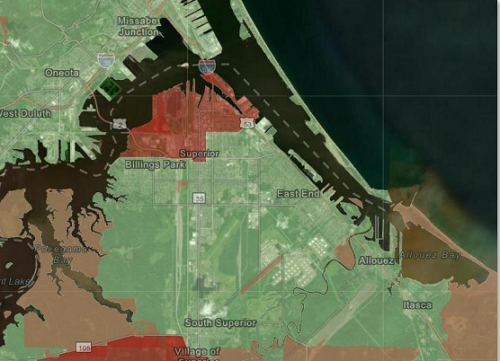
A citywide deployment, should the city pursue it, is expected to cost somewhere around $31 million. The city remains hopeful that much of the cost can be offset by what it hopes will be a 40 percent take rate among local residents and businesses.
Bountiful, Utah officials and community broadband advocates are breathing a sigh of relief as the Utah Taxpayers Association’s “Gather Utah” petition to stop the city from building an open-access network in partnership with UTOPIA Fiber fell short.
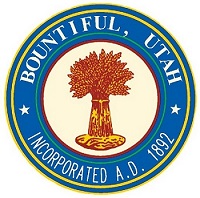
This past Friday was the deadline for “Gather Utah” to collect enough signatures for a petition that would have forced a citywide vote on the $48 million in revenue bonds authorized in May by city councilors to fund network construction.
In a press statement, City Manager Gary Hill said: “hired signature gatherers ultimately failed to collect enough signatures from registered voters to advance the opposition campaign.”
Bountiful Mayor Kendalyn Harris added:
“Bountiful is a unique city. Our residents started this process. They organized a ‘Fiber for Bountiful’ campaign that led to a thorough consideration of many options. We now look forward to offering a vital service to residents and businesses in an increasingly digital world.”
Now, after three years of study and more than two dozen public meetings, Bountiful Fiber will begin construction next month. As we previously reported, the city-owned fiber optic network will provide gigabit speeds to residents and businesses who subscribe for service.
Earlier this month American Association for Public Broadband (AAPB) President Gigi Sohn wrote an op-ed in the Salt Lake Tribune about how the “Gather Utah” campaign (backed by the cable industry) tried to derail the city’s project. After news of the petition failure, Sohn said:
Fort Piece, Florida officials say the city continues to make steady progress with its plan to expand access to affordable fiber to all 45,000 Fort Pierce residents with the help of the city-owned utility. The network, inspired by similar utility-backed efforts in cities like Chattanooga, promises to deliver multi-gigabit speeds at prices notably lower than regional monopolies.
Since 1972, the Fort Pierce Utilities Authority (FPUA) has provided gas, electric, water, and natural gas services to city residents. Since the early 2000s, FPUA has deployed 110 miles of optical fiber via its FPUAnet Communications division. In 2018, the city, frustrated by limited broadband competition, decided to expand network access to the public.
“Our network is moving along well,” Jason Mittler, FPUAnet manager told ILSR. “We have passed about 1000 parcels and will pass another 1000 next year.”
The full deployment is expected to take somewhere between five to ten years to finish, and is funded by bonds held by FPUAnet. The network is utilizing GPON fiber technology capable of 2.5 Gigabits per second (Gbps) downstream and 1.25 Gbps upstream in some areas, and XGS-PON-based fiber capable of symmetrical 10 Gbps speeds in others.
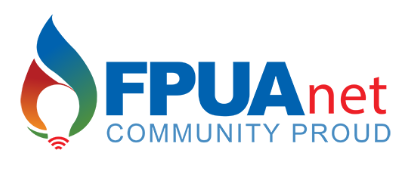
Mittler notes that the finished product should result in both last-mile speeds and pricing that regional telecom monopolies, predominantly AT&T and Comcast, are both unable and unwilling to offer. Especially on the upstream side of the equation.
Mittler says the plan remains to provide all locals with access to symmetrical 100 Mbps for $49 a month; symmetrical 200 Mbps for $69 a month; symmetrical 200 Mbps service for $69 a month, symmetrical 500 Mbps for $79 per month; and symmetrical gigabit for $99 a month.